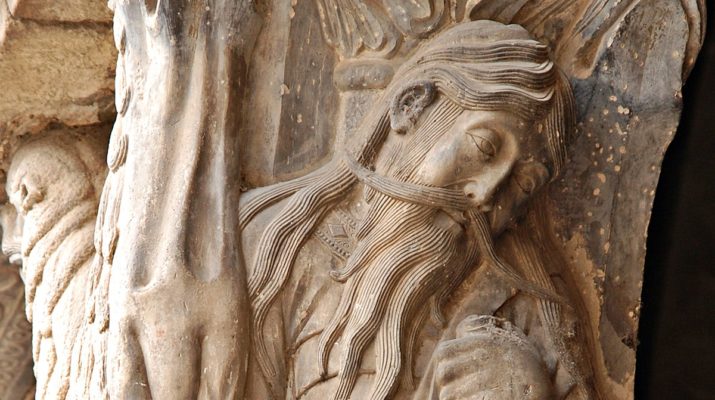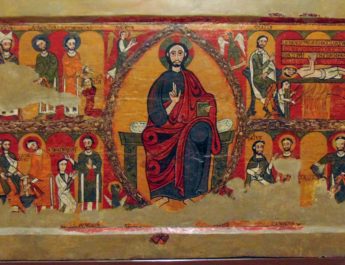Jeremiah 1:4-10
Ordinary C10
4 Now the wordA of the LordB cameC to me saying,
A “word” = dabar. From dabar (to speak, declare, discuss). This is speech, a word, a matter, an affair, charge, command, message, promise, purpose, report, request. It is a word, which implies things that are spoken of in a wide sense.
B “Lord” = YHVH. Related to “came” in v4. From havah (to be, become) or hayah (see note C below). This is the name of the God of Israel, the self-existent and eternal one, the tetragrammaton. This pronunciation has been lost to time so “Lord” is generally used in its place.
C “came” = hayah. This is to be or become, to happen.
5 “Before I formedD you in the wombE I knewF you,
D “formed” = yatsar. Perhaps related to yatsar (to be narrow, distressed, or vexed); perhaps related to tsarar (to bind, restrict, narrow, be cramped, an adversary). This is to fashion or form, perhaps by squeezing something into a shape or form. Particularly, it is to create as a potter does. Figuratively, it is to determine.
E “womb” = beten. Root may mean to be hollow. This is the belly or womb. It can also refer to a body more broadly.
F “knew” = yada. This is to know, acknowledge, advise, answer, be aware, be acquainted with. Properly, this is to figure something out by seeing. It includes ideas of observation, recognition, and care about something. It can be used causatively for instruction, designation, and punishment.
and before you were bornG I consecratedH you;
I appointedI you a prophetJ to the nations.”K
G “were born” = yatsa + rechem. Literally, “came out of the womb.” Yatsa is to go or come out, bring forth, appear. It is to go out in a literal or figurative sense. Rechem is related to racham (compassion, tender love, womb, compassion; the womb as that which cherishes the fetus). This is a womb.
H “consecrated” = qadash. From qodesh (set apart and so sacred; God is different from us and so God is holy/set apart; things we dedicate to God’s service are set apart for God and so they, too, are holy). This is set apart, consecrated, hallowed, sanctified. This is something or someone that is set apart for a holy purpose or use – ceremonially or morally clean.
I “appointed” = natan. This is to give, put, set, offer. It is to give literally or figuratively.
J “prophet” = nabi. This is prophet, prophecy, speaker, or someone inspired.
K “nations” = goy. From the same root as gevah (the back, person, or body); related to gev (among); related to gaah (to rise up). This is nation or people. Often used to refer to Gentiles or foreign nations. It can also be used figuratively for a group of animals. This is where the Yiddish “goy” comes from.
6 Then I said, “Ah,L LordM God!N TrulyO I do not know how to speak,P for I am only a boy.”Q
L “ah” = ahah. 15x in OT. This is alas or ah. It can be an exclamation of pain.
M “Lord” = Adonai. From adon (lord, master, owner); root means to rule or be sovereign. This is the actual Hebrew word for Lord used (in a different form) of humans and (in the present form) of God. It means someone who is in control.
N “God” = YHVH. Related to “came” and “Lord” in v4. From the same as YHVH (see note B above). This has the same meaning as “Lord” in v4, but with a different vowel pointing.
O “truly” = hinneh. From hen (lo! Behold! If, though; an expression of surprise). This is to draw attention, show suddenness or surprise, or to emphasize the importance of the coming statement. See! Lo! Behold!
P “speak” = dabar. Related to “word” in v4. See note A above.
Q “boy” = naar. May be from na’ar (to shake, toss up and down, tumble around). This is a child or a servant. It is a child in their active years so they could be aged anywhere from infancy to adolescence.
7 But the LordR said to me,
“Do not say, ‘I am only a boy’;
for you shall goS to allT to whom I sendU you,
and you shall speak whatever I commandV you.
R “Lord” = YHVH. Same as “Lord” in v4. See note B above.
S “go” = halak. This is go, come, walk. It is walk literally and figuratively and includes people and animals. It can be used figuratively for one’s moral life – how we walk according to God’s way or against it. It can also refer to the walk of life as in the course one’s life takes, the choices we make, etc.
T “all” = kol. From kalal (to complete). This is all or every.
U “send” = shalach. This is to send out, away, send for, forsake. It can also mean to divorce or set a slave free.
V “command” = tsavah. This is to charge, command, order, appoint, or enjoin. This is the root that the Hebrew word for “commandment” comes from (mitsvah).
8 Do not be afraidW ofX them,
for I am with you to deliverY you,
saysZ the Lord.”AA
W “be afraid” = yare. This is to fear, be afraid, dreadful. It can also refer to fearful reverence – to fear in a moral sense is to say to revere, respect.
X “of” = paneh. From panah (to turn, face, appear). This is face in a literal or figurative sense. It could be face, presence, anger, respect. It can also be used of God to indicate divine favor or presence.
Y “deliver” = natsal. This is to snatch someone or something away in a good sense – as rescue, defend, or deliver – or in a bad sense – as strip or plunder.
Z “says” = neum. From na’am (to speak a prophecy; properly, to whisper, which implies saying an oracle). This is an utterance or speaking an oracle.
AA “Lord” = YHVH. Same as “God” in v6. See note N above.
9 Then the LordBB put outCC his handDD and touchedEE my mouth;FF and the LordGG said to me,
BB “Lord” = YHVH. Same as “Lord” in v4. See note B above.
CC “put out” = shalach. Same as “send” in v7. See note U above.
DD “hand” = yad. This is hand, ability, power. Hand in a literal sense, but also what one can do or the means by which one does it.
EE “touched” = naga. This is touch, reach, arrive, come near, strike. This is touching for any reason including sexual or violent.
FF “mouth” = peh. This is mouth in a literal or figurative sense. So, more literally, it can be beak or jaws. More figuratively, it refers to speech, commands, or promises.
GG “Lord” = YHVH. Same as “Lord” in v4. See note B above.
“NowHH I have putII my words in your mouth.
10 See,JJ todayKK I appointLL you over nations and over kingdoms,MM
HH “now” = hinneh. Same as “truly” in v6. See note O above.
II “put” = natan. Same as “appointed” in v5. See note I above.
JJ “see” = raah. This is to see in a literal or figurative sense so stare, advise, think, view.
KK “today” = yom. Root may mean being hot. This is the day in a literal or figurative sense. It can also mean birth, age, daylight, continually or other references to time.
LL “appoint” = paqad. This is to attend to or visit – can be used for a friendly or violent encounter. So, it can be to oversee, care for, avenge, or charge.
MM “kingdoms” = mamlakah. From the same as melek (king, royal). This is kingdom, dominion, sovereignty, rule. It can also refer to the realm.
to pluck upNN and to pull down,OO
to destroyPP and to overthrow,QQ
to buildRR and to plant.”SS
NN “pluck up” = nathash. This is 21x in OT – 13 in Jeremiah. It is to pull up or pluck out, destroy, or tear away.
OO “pull down” = nathats. This is to pull down, demolish, break down, raze, overthrow.
PP “destroy” = abad. To wander off, lose self. This implies to perish, destroy, die, vanish, or be broken or corrupt.
QQ “overthrow” = haras. This is to break down, throw down, ruin, overthrow, or destroy. It is breaking down in pieces.
RR “build” = banah. This is to build, make, set up, restore, repair, or obtain children. It is to build literally or figuratively.
SS “plant” = nata. To fix or fasten, establish or plant. This is planting in a literal or figurative sense.
Image credit: “Jeremiah” from the Abbey of St. Peter in Moissac, France, 1085-1130.




